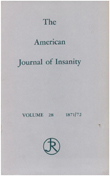Association of intelligence with severity of posttraumatic stress disorder symptoms in Vietnam Combat veterans
Abstract
OBJECTIVE: The purpose of this study was to determine whether intelligence predicts variance in posttraumatic stress disorder (PTSD) symptoms beyond that predicted by extent of combat exposure. METHOD: The subjects were 105 male Vietnam combat veterans. They completed the Mississippi Scale for Combat-Related Posttraumatic Stress Disorder, the Combat Exposure Scale, and the Shipley Institute for Living Scale, a measure of general intelligence. Number of years of education was recorded for each subject. RESULTS: Multiple regression analyses revealed that estimated full-scale IQ significantly predicted variance in PTSD symptoms beyond that predicted by extent of combat exposure. The lower a subject's intelligence, the more severe were his PTSD symptoms. CONCLUSIONS: Cognitive variables may affect the ability to cope with trauma, thereby affecting whether a person develops chronic PTSD.
Access content
To read the fulltext, please use one of the options below to sign in or purchase access.- Personal login
- Institutional Login
- Sign in via OpenAthens
- Register for access
-
Please login/register if you wish to pair your device and check access availability.
Not a subscriber?
PsychiatryOnline subscription options offer access to the DSM-5 library, books, journals, CME, and patient resources. This all-in-one virtual library provides psychiatrists and mental health professionals with key resources for diagnosis, treatment, research, and professional development.
Need more help? PsychiatryOnline Customer Service may be reached by emailing [email protected] or by calling 800-368-5777 (in the U.S.) or 703-907-7322 (outside the U.S.).



